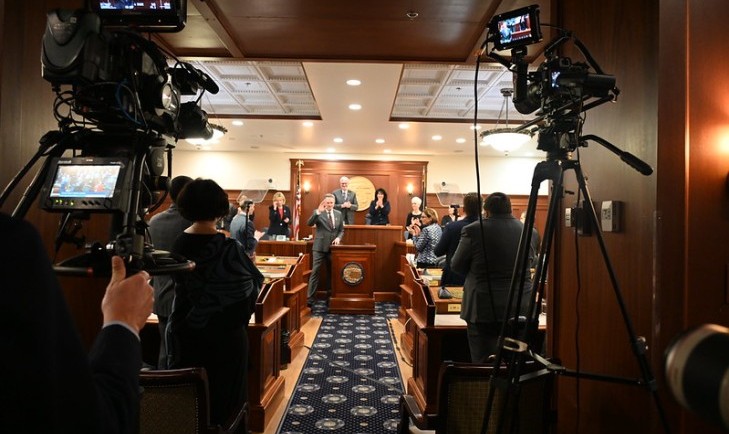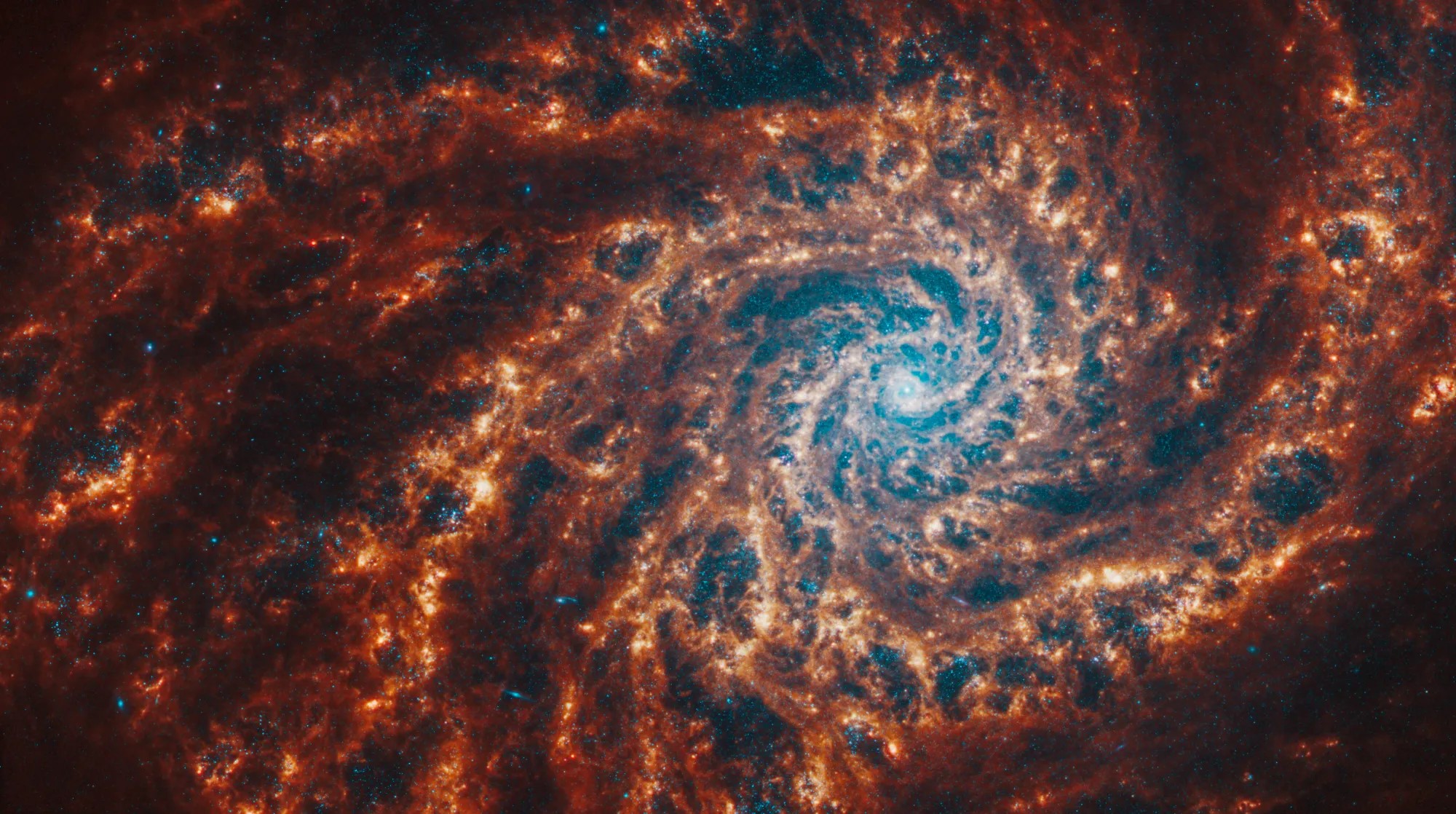
The Western Governors' Association keeps you updated on the latest news in the West. Here are the top stories for the week starting January, 29, 2024. (Photos courtesy of Governor Mike Dunleavy, and NASA, ESA, CSA, STScI, Janice Lee (STScI), Thomas Williams (Oxford) and the PHANGS team).
Alaska Governor Mike Dunleavy delivered his sixth State of the State Address this week, during which he outlined legislative priorities related to public safety, education reform, and reducing the state’s rising cost of living.
In terms of public safety, Governor Dunleavy proposed additional funds to hire another 10 Village Public Safety Officers, and four more investigators for the Missing and Murdered Indigenous Persons Unit.
He also emphasized the significance of investing in teachers and encouraged the legislature to pass The Teacher Retention and Recruitment Incentive Bill, which would offer monetary incentives to teachers based on location and tenure.
In order to reduce the cost of living, Governor Dunleavy proposed eliminating electrical tariffs on the Railbelt system and introduced legislation to improve the economics of Cook Inlet natural gas and advance the Alaska LNG Project to “deliver low-cost energy to Alaskans.”
He also proposed a new mortgage down payment assistance program, that he said, “will be able to help 1,100 to 1,300 families purchase their first home,” and discussed efforts to lower the price of these first homes by reducing the cost of materials.
Finally, Governor Dunleavy discussed efforts to bolster agricultural production via the CROP Act, which would increase access to capital through the Agriculture Revolving Loan Fund, provide premium support for crop insurance, and repeal institutional purchasing limits on Alaskan grown products for the next five years.
Read a full transcript of Governor Dunleavy's 2024 State of the State address here.
You can also read summaries of the other Western Govenrors' State of the State addresses here.
Natural Carbon Sequestration: The Oregon Climate Action Commission recently approved $10 million in investments via the newly created Natural and Working Lands Fund to reduce the state’s greenhouse gas emissions by funding projects for landowners across the state to implement voluntary “natural climate solutions” on their farms and ranches. A bulk of the investment also includes funds for carbon capture projects in forests, grasslands, and wetlands.
Learn more about natural carbon sequestration by registering for a livestream of WGA’s Decarbonizing the West workshop in Denver, Colorado on Feb. 7-8, or by watching previous initiative workshops.
Innovation Engines: The National Science Foundation announced grants to establish 10 inaugural Regional Innovation Engines across the country, including a Colorado – Wyoming Climate Resilience Engine, a North Dakota Advanced Agriculture Technology Engine, and a Southwest Sustainability Innovation Engine, and the Paso del Norte Defense and Aerospace Innovation Engine in New Mexico and Texas.
Mental health reform: Wyoming Governor Mark Gordon unveiled a plan this week for reforming Wyoming’s mental health system. The report and accompanying roadmap outlines efforts to drive down suicide numbers, bolster mental health staff, support those most in need, and identify gaps in service.
.jpg) Geothermal Power: Researchers at Princeton University's Zero-carbon Energy systems Research and Optimization Laboratory, also known as the ZERO Lab, teamed up with Fervo Energy to study the potential impact of utilizing Enhanced Geothermal Systems (EGS) to decarbonize electricity generation. It found that “benefits of EGS flexibility are robust across a range of electricity market and geothermal technology development scenarios.”
Geothermal Power: Researchers at Princeton University's Zero-carbon Energy systems Research and Optimization Laboratory, also known as the ZERO Lab, teamed up with Fervo Energy to study the potential impact of utilizing Enhanced Geothermal Systems (EGS) to decarbonize electricity generation. It found that “benefits of EGS flexibility are robust across a range of electricity market and geothermal technology development scenarios.”
Learn more about the potential for EGS by listening to an episode of WGA's Out West podcast with Colorado Governor Jared Polis, who led The Heat Beneath Our Feet initiative as the Chair of WGA, and the principal investigators from the Utah FORGE laboratory.
Citizen Scientists: The Bureau of Land Management is hoping to enlist the help of more members of the public in its scientific and research efforts. Last month the agency released its five-year Crowdsourcing and Citizen Science Action Plan to engage the community through science, inquiry, and collaboration to support management decisions.
“Just given the sheer number of acres that we manage, this kind of participation really amplifies the amount of work that we can get done and the amount of information that we can have to make our management decisions,” Nikki Grant-Hoffman, a BLM education specialist and was the plan’s lead author, said.
 A "treasure trove" of images: This week NASA released photos of 19 nearby spiral galaxies that the James Webb Space Telescope (JWST) captured. Scientists are studying the images and their analysis will "advance our understanding of star formation and the evolution of spiral galaxies," per a statement from the European Space Agency. Numerous western-based entities have been involved in the design, construction, launch, and operation of JWST, including the University of Arizona, Jet Propulsion Laboratory (NASA), Ames Research Center (NASA), along with WGA partner, Lockheed Martin.
A "treasure trove" of images: This week NASA released photos of 19 nearby spiral galaxies that the James Webb Space Telescope (JWST) captured. Scientists are studying the images and their analysis will "advance our understanding of star formation and the evolution of spiral galaxies," per a statement from the European Space Agency. Numerous western-based entities have been involved in the design, construction, launch, and operation of JWST, including the University of Arizona, Jet Propulsion Laboratory (NASA), Ames Research Center (NASA), along with WGA partner, Lockheed Martin.